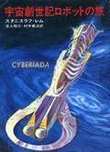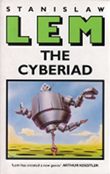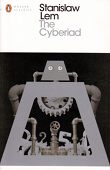The collaboration between Daniel Mróz, a visionary Polish illustrator, and Stanisław Lem, one of the most celebrated science fiction writers of the 20th century, resulted in a visual legacy that continues to captivate audiences today. Mróz’s illustrations for Cyberiad (Cyberiada in Polish) not only complemented Lem’s tales of robot engineers and futuristic societies but also added a layer of interpretation and artistry that elevated the text to new dimensions.
Daniel Mróz: The Artist
Daniel Mróz (1917-1993) was a master of surreal and fantastical illustration. Known for his meticulous pen-and-ink drawings, Mróz’s style combined elements of the grotesque, the absurd, and the mechanical. His works often featured anthropomorphic machines, bizarre creatures, and intricate details that drew viewers into otherworldly landscapes. Mróz’s background in fine arts and his unique ability to blend technical precision with boundless imagination made him the perfect match for Lem’s speculative fiction.
Lem’s Cyberiad: A Playground for Creativity
Published in 1965, Cyberiad is a collection of interconnected tales centered around two robot constructors, Trurl and Klapaucius. Through humor, philosophy, and satire, Lem explores profound themes such as artificial intelligence, morality, and the nature of creativity. The stories, while rooted in science fiction, are imbued with a timeless quality, blending technological speculation with the structure of fables and fairy tales.
Mróz’s illustrations captured the essence of Lem’s universe, visualizing the eccentric and often paradoxical worlds the author described. His drawings added depth and texture to Cyberiad, allowing readers to immerse themselves fully in the book’s whimsical yet thought-provoking narratives.
The Aesthetic of Mróz’s Cyberiad
Mróz’s illustrations for Cyberiad are distinguished by their surreal, almost Dadaist quality. The characters and environments he depicted were not literal interpretations of Lem’s descriptions but rather imaginative expansions of them. For instance:
-
Anthropomorphic Machines: Robots in Mróz’s art are often depicted as amalgamations of gears, pipes, and metal plates, imbued with human-like expressions and gestures. These designs emphasize the mechanical nature of Lem’s characters while highlighting their emotional and philosophical complexity.
-
Fantastical Landscapes: Mróz’s backdrops feature intricate machinery, labyrinthine structures, and surreal environments that evoke a sense of wonder and unease. These settings reflect the inventive and sometimes chaotic worlds of Cyberiad.
-
Humor and Irony: The playful absurdity of Lem’s stories is mirrored in Mróz’s art. His exaggerated and whimsical designs often carry a subtle satirical edge, inviting viewers to engage with the text on multiple levels.
Legacy and Influence
The partnership between Lem and Mróz was more than just an author-illustrator collaboration; it was a meeting of two creative minds that shared a fascination with the boundaries of imagination. Mróz’s illustrations have become iconic, shaping how readers visualize Lem’s universe and influencing subsequent interpretations of his works in other media, such as film and theater.
In contemporary culture, Mróz’s work continues to inspire artists and designers, particularly those drawn to speculative fiction and surrealism. The illustrations for Cyberiad are often studied as examples of how visual art can enhance and reinterpret literary texts.
Conclusion
Daniel Mróz’s illustrations for Stanisław Lem’s Cyberiad stand as a testament to the power of artistic collaboration. Through his intricate and imaginative drawings, Mróz not only brought Lem’s visions to life but also added his own voice to the narrative, creating a dialogue between text and image that remains unparalleled. Together, Lem and Mróz crafted a timeless masterpiece that continues to resonate with readers and viewers around the world.

“The Cyberiad” and “Robot's tales” (in the US volumes entitled “The Cosmic Carnival of Stanislaw Lem and "Mortal Engines" were also published) is a witty blend of traditional tales and science-fiction - there are “constructors” instead of wizards and magic; apparent miracles turn out to be the outcome of exceptional engineering capabilities. However, greedy kings, cruel and hungry for power, stem from our very own world. Just as among us, there live naive healers of the world, who believe it takes only one good idea to save humanity. In robots' states nothing good results from that. The case with us – suggests Lem – would be very similar, since neither evil nor (fortunately) good cannot be eradicated. And we will never give up telling tales.
 One day Trurl the constructor put together a machine that could create anything starting with n. When it was ready, he tried it out, ordering it to make needles, then nankeens and negligees, which it did, then nail the lot to narghiles filled with nepenthe and numerous other narcotics. The machine carried out his instructions to the letter. Still not completely sure of its ability, he had it produce, one after the other, nimbuses, noodles, nuclei, neutrons, naphtha, noses, nymphs, naiads, and natrium. 'This last it could not do, and Trurl, considerably irritated, demanded an explanation.
One day Trurl the constructor put together a machine that could create anything starting with n. When it was ready, he tried it out, ordering it to make needles, then nankeens and negligees, which it did, then nail the lot to narghiles filled with nepenthe and numerous other narcotics. The machine carried out his instructions to the letter. Still not completely sure of its ability, he had it produce, one after the other, nimbuses, noodles, nuclei, neutrons, naphtha, noses, nymphs, naiads, and natrium. 'This last it could not do, and Trurl, considerably irritated, demanded an explanation.
"Never heard of it," said the machine.
"What? But it's only sodium. You know, the metal, the element..."
"Sodium starts with an s, and I work only in n."
"But in Latin it's natrium."
"Look, old boy," said the machine, "if I could do everything starting with n in every possible language, I'd be a Machine That Could Do Everything in the Whole Alphabet, since any item you care to mention undoubtedly starts with n in one foreign language or another. It's not that easy. I can't go beyond what you programmed. So no sodium."
 The book can be read on two levels. Read simply for an entertainment, the stories could appear to a superficial reader as an overdose of a good thing. However, once a more sophisticated reader perceives their philosophical and moral implications and becomes aware not only of the author's daring imagination but also of the depth of his philosophical insight, the fables acquire a new dimension.
The book can be read on two levels. Read simply for an entertainment, the stories could appear to a superficial reader as an overdose of a good thing. However, once a more sophisticated reader perceives their philosophical and moral implications and becomes aware not only of the author's daring imagination but also of the depth of his philosophical insight, the fables acquire a new dimension.
"The New York Review of Books"
Lem's explosive inventiveness is immediately apparent in "The Cyberiad", aptly subtitled "Fables for the Cybernetic Age", a cycle of tales focusing on the adventures of two intelligent robots, named Trurl and Klapaucius, who are master builders ("constructors") of computers and who sally about the cosmos meeting challenges, solving problems and being, by turns, cybernetic hero-sages, and all-round nuisances and fools. The tales are sometimes wildly funny, full of intellectual slapstick and outrageous puns (frequently playing on mathematical and cybernetic vocabulary).
George Scheper

In "The Cyberiad" the paradigm taken from physics is treated in a rather humorous way. One can see this quite well in the short story "The Dragons of Probability" that makes use of the nomenclature of quantum mechanics. Dragons that are, dragons that aren't, virtual dragons - all of this are games from the rich apparatus of modern physics according to which there is no such thing as "nothing" (i.e. vacuum) - instead there are zillions of virtual particles. Theoretical physicists always liked this book. A certain Polish physicist translated "Dragons of Probability" to English in order to show it to his Western colleagues - all of this happened quite a long time ago, when only a few books of mine were published in the West.
One day Trurl the constructor put together a machine that could create anything starting with n. When it was ready, he tried it out, ordering it to make needles, then nankeens and negligees, which it did, then nail the lot to narghiles filled with nepenthe and numerous other narcotics. The machine carried out his instructions to the letter. Still not completely sure of its ability, he had it produce, one after the other, nimbuses, noodles, nuclei, neutrons, naphtha, noses, nymphs, naiads, and natrium. 'This last it could not do, and Trurl, considerably irritated, demanded an explanation.














